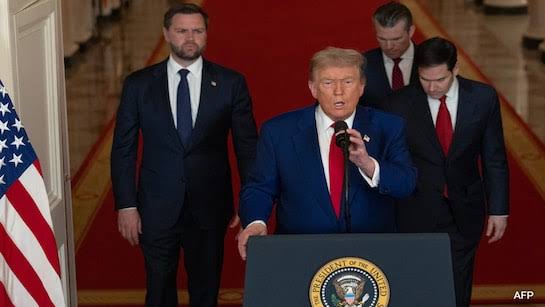 Since June 2025, the Middle East has entered perhaps its most perilous chapter in decades. Israel launched a bold direct strike campaign—Operation Rising Lion—against Iran, targeting nuclear facilities and key military sites  . In an unprecedented move, the U.S. under President Trump joined in, conducting airstrikes on Iran’s nuclear sites at Fordo, Natanz, and Isfahan using bunker-busters and cruise missiles . The result: dramatic damage to Iran’s nuclear infrastructure, but also fierce Iranian retaliation via missile barrages against Israel . The risk of a broader regional conflagration now looms larger than ever.
Since June 2025, the Middle East has entered perhaps its most perilous chapter in decades. Israel launched a bold direct strike campaign—Operation Rising Lion—against Iran, targeting nuclear facilities and key military sites  . In an unprecedented move, the U.S. under President Trump joined in, conducting airstrikes on Iran’s nuclear sites at Fordo, Natanz, and Isfahan using bunker-busters and cruise missiles . The result: dramatic damage to Iran’s nuclear infrastructure, but also fierce Iranian retaliation via missile barrages against Israel . The risk of a broader regional conflagration now looms larger than ever.
President Trump, ironically cast now in a role once foreign to him, has taken center stage in this crisis. His involvement marks a dramatic pivot from his earlier “America First” foreign policy posture. Critics now argue that he’s embraced a more overtly interventionist role—one reminiscent of neoconservatism—fundamentally abandoning his prior rhetorical aversion to entangling wars . He rose to power partly by decrying interventions, but has now opted to engage U.S. military power decisively in the Middle East.
This transformation echoes the historical figure Winston Churchill: a leader who once fought isolationism to protect Britain, only to embrace military force when faced with existential threats. Some analysts draw parallels between Churchill’s decision in 1940 to neutralize the Vichy French fleet and Trump’s current strike on Iran’s nuclear installations  . The comparison is strategical: preserving Western values—even at high cost—through preemptive military action. Supporters interpret Trump’s step as “Churchillian ruthlessness” aimed at preserving global security; detractors warn it may plunge us into protracted warfare, undermining world order.
Trump’s personal stakes are also significant. The highest-profile moment of the war—U.S. strikes without congressional approval—encapsulates a presidency that has skirted legal and constitutional norms . At home, his bold intervention divides his own political base. Some hail him as a decisive leader reinstating American credibility; others—especially swing voters—are uneasy, fearing drift into a costly, region-wide war . For many, this moment may define Trump’s legacy: courageous protector or heedless adventurer.
Decades hence, historians will examine this period not only in terms of immediate outcomes but as a culmination of Trump-era policies. His earlier withdrawal from the 2015 Iran nuclear deal, reimposition of sanctions, and the assassination of General Qasem Soleimani in 2020 established a trajectory of confrontation . Each step backfired, driving Iran deeper into nuclear development and escalating tensions region-wide. The current war is the logical endpoint of that path—and it puts Trump in a biniment where decisions are judged in existential terms.
Yet the future remains uncertain. Israel—despite its military advantage—may struggle to neutralize Iran’s deeply buried nuclear capabilities and manage ballistic missile reprisals . Iran, for its part, retains avenues for escalation: counterstrikes against regional U.S. assets, cyber warfare, disruptions to global oil markets, and covert assistance to proxy militias . The risk: a broader conflagration that undermines regional stability and haunts generations.
Historians might frame Trump’s presidency around several contrasting themes:
On one hand, his backers will argue that he acted decisively to destroy Iran’s path to nuclear weapons, reinforcing deterrence, protecting Israel, and reviving U.S. credibility as a global power. They’ll crown him the “Churchill of his time”—a leader who acted when others delayed, willing to wield force to maintain liberal order  .
On the other, skeptics will see a man who abandoned earlier restraint, bypassed democratic oversight, and gambled with global security for personal image and political gain. They’ll note that his actions laid the groundwork for decades of sustained instability and prompted a dangerous arms race .
Bridging these perspectives is the broader strategic calculus: whether military intervention can dismantle Iran’s nuclear ambitions without provoking a fragmented, violent aftermath. Diplomacy has failed—tepid attempts at talks in Muscat collapsed amid conflict —but military action may deliver gains that are short-lived or counterproductive if not followed by a coherent political strategy. Nearly all experts warn that boots on the ground or sustained pressure will be required to convert victory into peace—far beyond the remit of initial strikes .
Finally, there’s the question of global power alignment. Trump’s step deepens U.S. involvement just as China intensifies its assertiveness in Asia. By reasserting U.S. military might, some say Trump acted to shore up prestige globally . But risking U.S. lives and dollars in a secondary theater also critics see as weakening America’s ability to respond elsewhere.
⸻
In the long view, Trump’s legacy may settle into one of two competing narratives:
• Heroic protector: A leader who seized a decisive moment to neutralize a looming nuclear crisis, shored up alliances, and defended democratic values through bold action.
• Reckless gambler: A president who abandoned earlier restraint, sidestepped constitutional checks, and endangered global stability for short-term triumph and personal grandstanding.
History will judge not only actions—but consequences. If the war ends with Iran’s nuclear roll-back, limited casualties, and a renewed diplomatic architecture, Trump may win posthumous praise. If, instead, it births years of conflict, economic shock, and new nuclear proliferation, he’ll be remembered as the man who started a war that never truly ended.
That judgment depends, ultimately, on who shapes the aftermath: leaders in Tehran, Jerusalem, Washington—and how much the world embraces diplomacy vs. dust settles through force.
By : Jide Adesina
1stafrika.com
June 22, 2025

